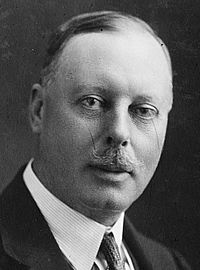Sir Horace Rumbold, 9th Baronet facts for kids
Quick facts for kids
Sir Horace Rumbold, 9th Bt
|
|
|---|---|

Sir Horace Rumbold, Bt.
|
|
| British Ambassador to Germany | |
| In office 1928–1933 |
|
| Monarch | George V |
| Preceded by | Sir Ronald Lindsay |
| Succeeded by | Sir Eric Phipps |
| Personal details | |
| Born | 5 February 1869 St. Petersburg, Russian Empire |
| Died | 24 May 1941 (aged 72) Tisbury, Wiltshire |
| Nationality | British |
Sir Horace George Montagu Rumbold, 9th Baronet (born February 5, 1869 – died May 24, 1941) was an important British diplomat. A diplomat is someone who represents their country in other nations. Sir Horace traveled a lot and learned many languages, including Arabic, Japanese, and German. He is best known for being the British Ambassador to Berlin from 1928 to 1933. During this time, he warned about the dangerous plans of Adolf Hitler and Nazi Germany.
Contents
Early Life and School
Horace Rumbold was born on February 5, 1869, in St. Petersburg, which was then part of the Russian Empire. His father was also named Horace Rumbold, and his mother was Caroline Barney. Horace went to Aldin House Prep School and then to Eton College, a famous school in England.
A Career in Diplomacy
Horace Rumbold began his career as an honorary attaché in The Hague from 1889 to 1890. An attaché is a junior diplomat who helps out at an embassy. His father was the ambassador there at the time. In 1891, Horace passed the exams to officially join the Diplomatic Service.
After working for a year in London at the Foreign and Commonwealth Office (which handles international relations), he served in many different cities around the world. Between 1900 and 1913, he worked in Cairo, Tehran, Vienna, Madrid, and Munich.
Working in Tokyo and Berlin
From 1909 to 1913, Rumbold was in Tokyo, Japan. Then, in 1913, he moved to Berlin, Germany, where he became a counsellor. A counsellor is a senior diplomat who advises the ambassador.
In July 1914, the ambassador, Sir Edward Goschen, went on leave. This meant Rumbold was in charge of the British Embassy in Berlin. He handled important talks in the days leading up to the start of the First World War. On August 5, 1914, Rumbold left Berlin with the ambassador. Crowds were attacking the embassy and their train as they left.
After World War I
After the war, Rumbold continued his important work. In 1916, he became the ambassador to Berne, Switzerland. Then, in 1919, he was appointed ambassador to Poland.
The next year, he became the High Commissioner to Constantinople (now Istanbul) in Turkey. While there, he signed the Lausanne Treaty for the British Empire. A High Commissioner is like an ambassador, but for countries within the Commonwealth. From 1924 to 1928, he served as ambassador to Madrid, Spain.
Ambassador to Germany (1928-1933)
In 1928, Sir Horace Rumbold took on his last and most important role: ambassador to Berlin, Germany. At first, he supported trying to make peace with the German government. He hoped this would stop the rise of strong nationalist groups like Adolf Hitler's Nazi Party.
However, when Hitler came to power in 1933, Rumbold became very worried. He sent many messages back to the British government, criticizing the Nazis. On April 26, 1933, Rumbold sent his final report, called a valedictory despatch, to the Foreign Office. In it, he gave a very clear and honest view of Hitler, the Nazis, and their plans.
He wrote that Hitler believed people and nations were meant to fight. He thought that countries that stopped fighting would fail. Hitler believed that peace was a bad idea and that only brute force could help a nation survive. He wanted Germany to take over more land and gather all German-speaking people. Rumbold explained that Hitler thought it was wrong to preach international understanding. He even made fun of peace agreements.
Rumbold ended his report with a strong warning about the future of international relations. He felt it was wrong to hope for things to return to normal. He believed the German government was creating a mindset that could only lead to trouble. He also felt that the people leading Hitler's government were "not normal."
Sir John Simon, who was the British Foreign Secretary, found Rumbold's descriptions very worrying. Later, after Rumbold's death, Lord Vansittart said that Rumbold's warnings about Nazi Germany were clearer than any other information they received.
Awards and Honors
Sir Horace Rumbold received several important awards for his service:
- He became a Member of the Royal Victorian Order (MVO) in 1907.
- He was made a Knight Commander of the Order of St Michael and St George in 1917.
- He joined the Privy Council of the United Kingdom in 1920. The Privy Council advises the King or Queen.
- He was appointed a Knight Grand Cross of the Order of St Michael and St George (GCMG) in 1922.
Family Life
On July 18, 1905, Horace Rumbold married Etheldred Constantia Fane. Her father was also a British diplomat.
When his father died in November 1913, Horace became the 9th baronet. A baronet is someone who holds a special title passed down through their family.
Horace and Etheldred had one son and two daughters. Sadly, their younger daughter died young in 1918.
Sir Horace Rumbold retired in June 1933 because of his age. However, he later served on the Peel Commission, which was a group looking into issues in Palestine. He passed away on May 24, 1941, at the age of 72, at his home in Tisbury, Wiltshire. His son, Anthony, took over his baronet title and also became a well-known diplomat.
 | Isaac Myers |
 | D. Hamilton Jackson |
 | A. Philip Randolph |

